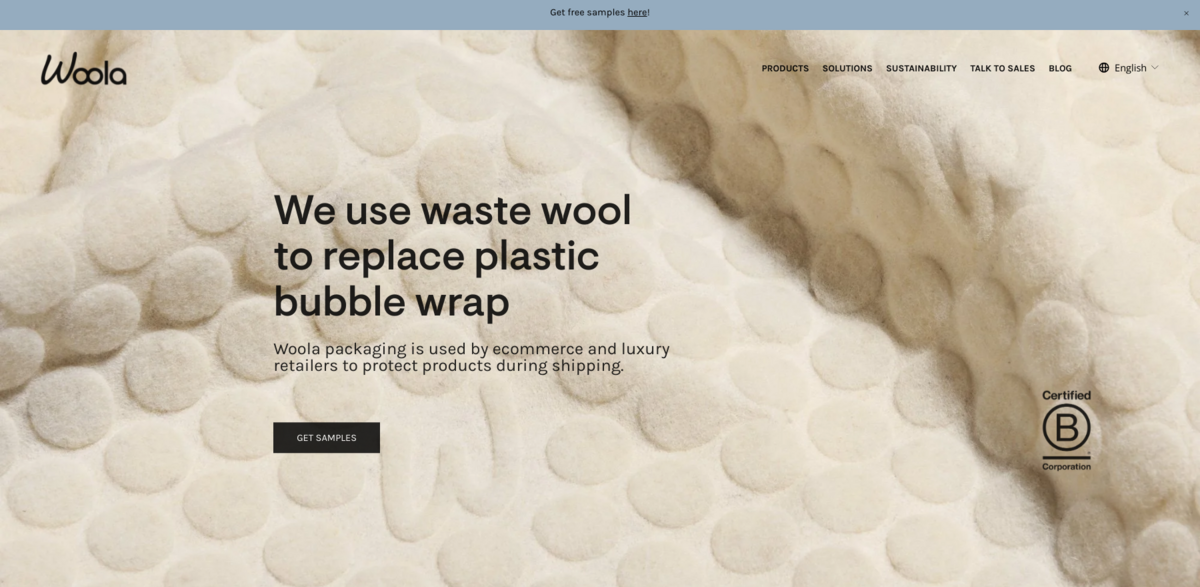What is Woola?
Woola is shaking up the world of postal packaging by offering a sustainable alternative to traditional bubble wrap. Designed especially for ecommerce and luxury retailers, Woola packaging protects products during shipping — but with a twist. Instead of relying on plastic, Woola uses waste wool sourced locally from farmers. This leftover sheep wool, which often goes unused, is transformed into a durable, eco-friendly packaging material. It’s a clever way to keep precious resources in the loop and reduce plastic waste.
The Main Benefit: Cutting Plastic Waste
Woola’s mission is ambitious but clear: to cut 50% of global fossil fuel-based bubble wrap usage by 2030. Here are some key figures and facts that highlight why this matters:
- Around 200,000 tonnes of sheep wool goes unused in Europe every year.
- Plastic packaging takes over 500 years to decompose in landfills or nature.
- Wool’s natural properties — elasticity, water repellency, and resistance to temperature extremes — make it perfect for cushioning fragile items.
- Woola packaging is durable and reusable multiple times, reducing the need for single-use plastics.
- The project aims to create a “closed-loop” system where packaging can be reused, repurposed, or returned, so nothing goes to waste.
Why Wool? The Natural High-Tech Fibre
Wool isn’t just some old-fashioned fabric — it’s a high-tech fibre with some pretty amazing qualities. Its elasticity means it can absorb shocks and protect delicate items during shipping. Plus, wool naturally repels water and can handle extreme temperatures, making it a reliable choice for packaging. Unlike plastic, wool is biodegradable and sustainable. Turning waste wool into packaging is a smart way to give this material a second life, reducing environmental impact while keeping products safe.
Plastic Packaging: The Problem We Face
Plastic packaging is everywhere — and that’s a big problem. It’s been the go-to choice for protective packaging for decades, but it comes with a heavy environmental cost. Plastic takes centuries to break down, piling up in landfills and polluting oceans and landscapes. The world needs alternatives that don’t rely on fossil fuels or create long-lasting waste. Woola’s approach offers a fresh, sustainable solution that challenges the status quo.
Turning Waste into a Better Solution
What’s really cool about Woola is how it uses waste — specifically, waste wool that would otherwise be thrown away. Instead of letting this valuable resource go to waste, Woola transforms it into a protective packaging material that’s both sustainable and effective. This approach not only reduces plastic consumption but also supports local farmers by sourcing wool that might otherwise be discarded. It’s a win-win for the environment and the community.
Project Impact: Linking to Sustainable Development Goals
- SDG 12: Responsible Consumption and Production — by reducing plastic waste and promoting reuse.
- SDG 13: Climate Action — cutting down fossil fuel-based plastic production.
- SDG 15: Life on Land — supporting sustainable farming and reducing waste.
- SDG 9: Industry, Innovation, and Infrastructure — developing innovative packaging solutions.
- SDG 17: Partnerships for the Goals — collaborating with farmers and retailers to create a circular system.
Looking Ahead: A Lighter Footprint for Packaging
Petroleum-based plastic has been the default for protective packaging for far too long. Woola is proving that there’s a better way — one that’s lighter on the planet and smarter for business. Their customizable solutions can scale to meet different needs, making sustainable packaging accessible for a wide range of industries. The goal? To make packaging not just protective but also part of a closed-loop system where materials keep circulating instead of ending up as waste. It’s a bold vision, but one that’s gaining momentum as more companies and consumers look for greener options.


















